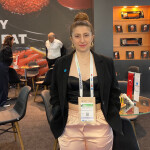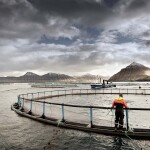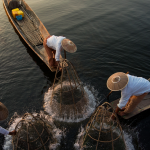A new scheme is seeing some of London’s top restaurants willing to pay more for their fresh fish from certain ports in the Southwest of the country, comfortable in the knowledge that the seafood they are buying is fully traceable and the catchers are adhering to responsible fishing practices that protect the viability of their fishery.
Launched last week by the U.K. charity Blue Marine Foundation, with the collaboration of inshore fishermen from the four Lyme Bay ports of West Bay, Lyme Regis, Beer and Axmouth on the Dorset and Devon border, the “Reserve Seafood” brand is the culmination of a three-year initiative to regenerate 90 square miles of reef while safeguarding the fishers’ futures. In return for signing up to a strict conservation code and electronic monitoring, these fishers have received new chiller rooms, ice-makers and freezer units.
At the same time, a partnership has been created with Seafish’s Responsible Fishing Scheme (RFS) to build the sustainable, traceable and quality credentials of the Reserve Seafood label.
Connecting the fishery with the capital’s chefs is leading fresh fish supplier Direct Seafoods, which collects each day’s catch from the Lyme Bay ports and transports it to its London depot for onward delivery to the restaurants.
Every box of seafood collected by Direct Seafoods carries a “Lyme Bay Reserve Seafood” label, detailing the scheme and the port where it was landed. This branding is retained all the way through to the chefs who can then make their customers aware of the provenance of the food they are eating.
Laky Zervudachi, sustainability director at Direct Seafoods, told SeafoodSource that thanks to trials conducted in the second-half of last year, several chef customers are already “gratefully receiving” Reserve Seafood products.
They love the fact that they can promote the freshness and quality of the fish they are serving and that they can tell their diners exactly how and where it was caught, he said, adding that sustainability is a “key ingredient” to the scheme’s success.
As well as guaranteeing their future livelihoods by fishing responsibly, Lyme Bay’s fishermen are also seeing a significant uplift in the prices they earn for the products they’re supplying, which include premium quality lobsters, brown crabs, diver scallops, seabream, seabass and rays. In addition, some chefs are eager to receive and pay for underutilized species, such as spider crabs, whiting and pouting which were previously thrown back or used for bait.
The fishermen are also reporting an increase of most species in their waters.
Gavin Zieman, a fisherman at Axmouth believes the project has made the harbor a sustainable, viable port for the small boats.
“It makes what we’re catching and landing a lot more attractive to a much wider set of people. We’ve seen an increase of between 20 and 30 percent. Good stable prices, which makes a big difference to us,” he said.
Jim Newton, chairman of Beer and East Devon Fisherman’s Association, confirmed Lyme Bay fish was now getting “top dollar” and described the project as “common sense.”
However, things could have been very different for the fishery. Despite a government enforced closure of a 60-mile area to scallop dredging and trawling in 2008, the area, which includes reefs rich in corals and sea fans, continued to be overfished by pots and static gear. This threatened the viability of the fishing industry, with some reporting catch declines of 50 percent.
The Blue Foundation’s solution was to involve the local fishermen in conservation and it encouraged them to take a lead role in establishing measures to protect their fishery’s future within a working group also comprising regulators, conservationists, scientists and other stakeholders.
It called the area the “Lyme Bay Fisheries & Conservation Reserve,” to which fishermen gained access by agreeing to limits on the number of pots and nets that can be used as well as using a mobile-phone-based inshore vessel monitoring system (iVMS), which records every boat’s position and its catches. Forty-five boats currently belong to the regeneration project.
The foundation has more projects in the pipeline – among them, the restoration of oyster fishing in an area in the Solent, on the U.K. south coast. Fishing was banned there in 2013 when annual oyster harvests fell from 200 metric tons (MT) to 20 MT and oysters failed to reproduce.






